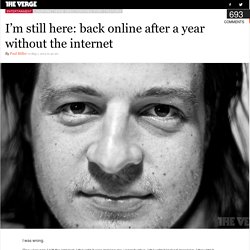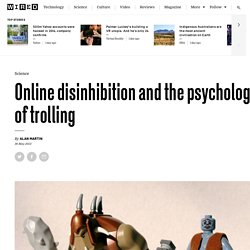

How to Quit Wasting Time on the Internet. Louis C.K.'s Girls Can't Have Cell Phones. Everything's+Amazing+ +Nobody's+Happy. I’m still here: back online after a year without the internet. I was wrong.

One year ago I left the internet. I thought it was making me unproductive. I thought it lacked meaning. I thought it was "corrupting my soul. " It's a been a year now since I "surfed the web" or "checked my email" or "liked" anything with a figurative rather than literal thumbs up. And now I'm supposed to tell you how it solved all my problems. But instead it's 8PM and I just woke up. I didn't want to meet this Paul at the tail end of my yearlong journey.
In early 2012 I was 26 years old and burnt out. I thought the internet might be an unnatural state for us humans, or at least for me. My plan was to quit my job, move home with my parents, read books, write books, and wallow in my spare time. My goal would be to discover what the internet had done to me over the years But for some reason, The Verge wanted to pay me to leave the internet. My goal, as a technology writer, would be to discover what the internet had done to me over the years. This was going to be amazing. Read next. Pranking My Roommate With Eerily Targeted Facebook Ads. Is Google Making Us Stupid? Illustration by Guy Billout "Dave, stop.

Stop, will you? Stop, Dave. Will you stop, Dave?” So the supercomputer HAL pleads with the implacable astronaut Dave Bowman in a famous and weirdly poignant scene toward the end of Stanley Kubrick’s 2001: A Space Odyssey. I can feel it, too. I think I know what’s going on. For me, as for others, the Net is becoming a universal medium, the conduit for most of the information that flows through my eyes and ears and into my mind.
I’m not the only one. Bruce Friedman, who blogs regularly about the use of computers in medicine, also has described how the Internet has altered his mental habits. Anecdotes alone don’t prove much. It is clear that users are not reading online in the traditional sense; indeed there are signs that new forms of “reading” are emerging as users “power browse” horizontally through titles, contents pages and abstracts going for quick wins. Reading, explains Wolf, is not an instinctive skill for human beings. Also see: Online disinhibition and the psychology of trolling. Dunechaser/Flickr/CC BY-NC-SA 2.0 In everyday life, decorum dictates that certain things just don't happen.

Funerals, even for divisive figures tend to go by with solemn respect. Compare this with a recent example of online trolling at its most extreme: In 2011, a Reading man was jailed for raiding the Facebook tribute pages of a 14 year old girl who had committed suicide, filling it with crass jokes and insults. He had never met the girl in question. That's an extreme example, but it's a phenomenon almost as old as the internet itself: trolling. Common wisdom dictates that people are more aggressive, rude and forthright online because they're anonymous and can act as unpleasantly as they like without immediate consequence. Psychologist John Suller wrote a paper on this in 2004, entitled "The Online Disinhibition Effect", where he explored six factors that could combine to change people's behaviour online.